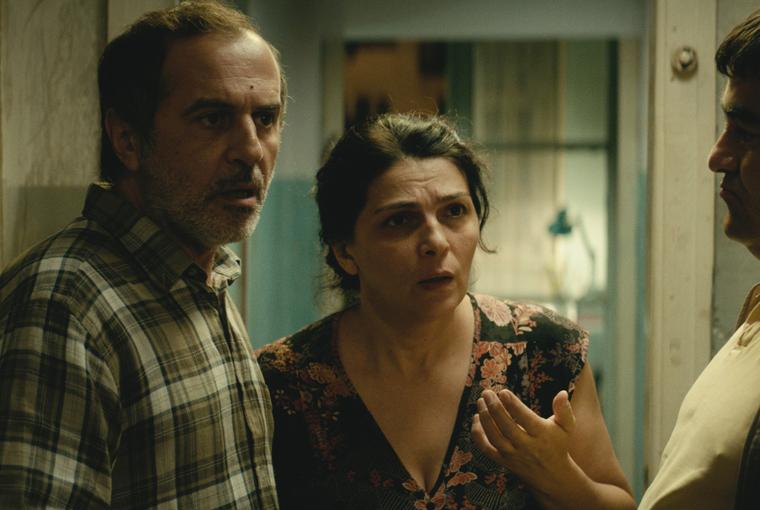An Apartment of One’s Own
Nana Ekvtimishvili and Simon Gross’ My Happy Family (Chemi bednieri ojakhi, 2017)
Vol. 72 (February 2017) by Zoe Aiano
Manana (Ia Shugliashvili) wants to move out of her family home. There’s no specific reason, nothing dramatic has happened. She just wants her own space. This simple gesture shocks and appalls her loved ones, however, who do everything they can to intervene in the hope that this phase will pass without causing an irreparable scandal.
Nana & Simon’s My Happy Family is far from the banal film the off-putting title and the uninspiring synopsis might suggest it is. In fact, it subtly but unambiguously evokes all the draining stress of family relationships, offering something like female-centric Sieranevada for the fainthearted. Rather than repeating the intense visceral experience of Cristi Puiu’s monolithic masterpiece from 2016, it prefers a more low-key tone, counterbalancing the claustrophobic clamor of quarrels around the kitchen table with the pared-down serenity of Manana’s new life of solitude.
Like Sieranevada, it takes a while to figure out the exact relationships between the three generations of characters who are all crammed into the same apartment. Such is the lack of affection between Manana and her husband Soso (Merab Ninidze) that he could initially be mistaken for a brother. Her amusingly cantankerous parents (Berta Khapava and Goven Cheishvili) could belong to either of them, and indeed seem to take Soso’s side in most matters. Her son Lasha (Giorgi Tabidze) is constantly underfoot as he seemingly wastes his days on the computer when he should be studying. On top of that, she also has to suffer the daily awkwardness of intruding on her daughter Nino (Tsisia Qumsishvili) and son-in-law Vakho (Giorgi Khurtsilava) since the family’s communal wardrobe is kept in their room.
Manana’s presence is largely overlooked and taken for granted, and her own desires either go unheard or overruled. Indeed, the narrative starts from her 52nd birthday. Despite repeatedly stating that she has no intention of celebrating it, she is overruled by both Soso and her mother, who defy her by inviting a large group of friends over and then berating her for not engaging with the guests enough.
While the motivation behind Manana’s actions requires no explanation for audiences, her family are completely bewildered and desperately seek a tangible event to blame. Why would she leave a husband who doesn’t drink to excess and doesn’t beat her? What more does she want? How can she do this to them? Doesn’t she realize that she’s risking the health of her cousins by causing them to lose sleep? The idea of acceptance of the status quo and tolerance of everything not actively damaging runs throughout. Skeletons do gradually begin to tumble out of the closet, however, but not in relation to Manana. She genuinely wants nothing more than independence and peace, and the ability to eat cake whenever she feels like it. Moreover, as the various conflicts begin to arise, she demonstrates that she is perfectly capable of being supportive despite not being physically present all the time.
The most nauseatingly intrusive of her relatives is her brother Rezo (Dimitri Oragvelidze), who gathers together far-flung members of the clan in an attempted intervention, which is poignantly and entertainingly melodramatic and entirely illogical. Time and again, he refuses to accept his sister’s decision, deeming her incapable of looking after herself, and even goes so far as to enlist the help of local thugs to watch over her. Clearly, it is this precise lack of agency that Manana is trying to resist, and she only seems to be able to control her own circumstances within the solitude of her shabby, teal-colored apartment. Throughout the film, the cinematography consistently maintains a shallow depth of field, foregrounding Manana and her perspective in the exterior shots and adding to the nausea-inducing chaos of the frenetic family scenes. In the idyll of her apartment, however, the camera finally gives her space, gently hovering, lingering on the quiet and the fresh air circulating in from the balcony.
In a particularly moving sequence, Manana happens to run into an old school friend who invites her to a reunion of classmates at a fancy home somewhere on the outskirts of town. Up to that point, despite being the sole protagonist, Manana has spoken very little and revealed very few details about her personality and background. Throughout the film, she largely exists in negative space, either wearily brushing aside others’ preconceptions of how she should be or simply being in silence. This narrative strand suddenly alludes to a previous existence that not only pre-dates her middle-aged status and her career as a teacher, but also her marriage. There is a fleeting moment in which we are offered a glimpse of Manana’s potential future as a rounded character, which is made even more poignant by the fact that it is almost immediately shattered by her new-found friends as they instantly begin labeling and making assumptions.
At times, the imagery verges on cliché, jeopardizing the film’s otherwise refreshingly delicate touch. At one point, for example, we witness the newly emancipated Manana planting tomatoes, presumably because otherwise we wouldn’t understand that she is putting down roots. She also regains her voice, specifically her singing voice, which is very beautiful and touching, but unfortunately for the filmmakers is also a device used in a multitude of stories about women released recently. Also, given that it is clear from the outset that the narrative won’t end up having a neat conclusion, the film finishes at a slightly unsatisfying point, and could benefit from either finishing sooner or later, or simply from introducing fewer sub-themes on the whole.
Aside from these relatively tiny flaws, My Happy Family is a triumph of tender realism that convincingly and wittily captures the difficulty of breaking away from traditional norms and of trying to align self-perception with the blinkered view of others. Moreover, it does so through an atypical central character whose experiences could easily have been a youthful crisis. While Manana’s individual living situation is inherently Georgian, the themes that arise through it are so universal that it is sure to resonate profoundly with a wide range of viewers, not only Georgians and not only women.




Leave a Comment